Chennai Six: Nick Dunn reveals what Indian prison life was like
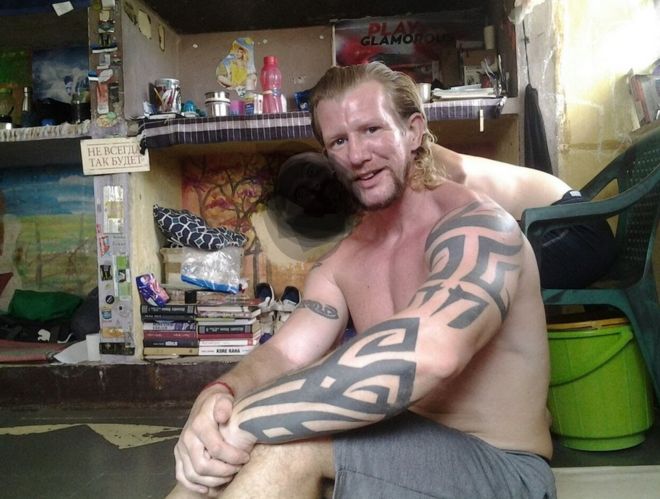 NICK DUNN
NICK DUNN
Nick Dunn was one of six British ex-servicemen who spent years imprisoned in India for a crime they did not commit. They faced the daily threat of violence, a scramble for food, and encountered rats the size of cats. How did the former paratrooper, who had served in Iraq and Afghanistan, cope with incarceration?
A thin mattress on a filthy stone floor for a bed. A hole in the ground for a toilet. Scavenged carrots and potatoes for a meal.
The photographs Nick Dunn snapped on a spy-pen are grainy and fleeting, but for he and his fellow members of the Chennai Six (named after the Indian city where they were incarcerated), what they depict was their everyday reality for two and a half years.
"The conditions were bleak, basic and dirty," recalls Nick, from Ashington in Northumberland, adding: "Every day was like Groundhog Day."
Nick and the other five men were working as armed security guards, employed to protect against Somali pirates, when they were intercepted on the merchant ship MV Seaman Guard Ohio off the Indian coast in October 2013.
They were accused of being illegally armed in Indian waters - they weren't, as a court ruled some four years later. They had all the required documentation for their weapons, and their presence in Indian waters was justified because they needed to pick up emergency supplies amid stormy weather.
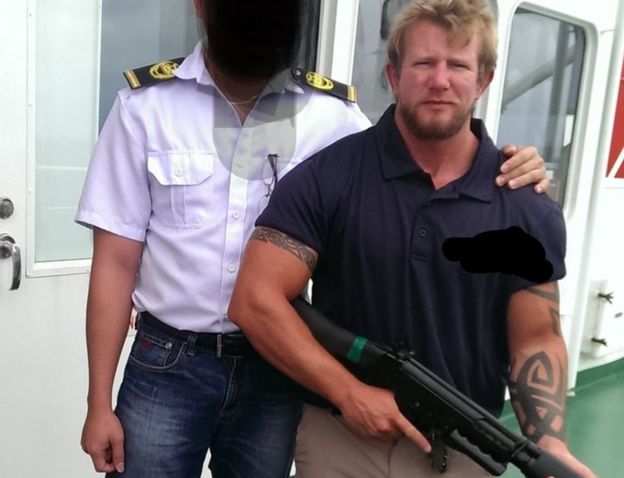 NICK DUNN
NICK DUNN
From Nick's point of view it was a misunderstanding, one that would no doubt be cleared up after a brief period of confusion.
But Indian prosecutors persisted with the case.
Days turned to weeks, weeks turned to months and months into years as it limped through the courts.
Some of their time was spent in hostels and hotels, thanks to a 130,000-signature petition collected by the men's families and submitted to the UK government calling on the Indian authorities to grant them bail.
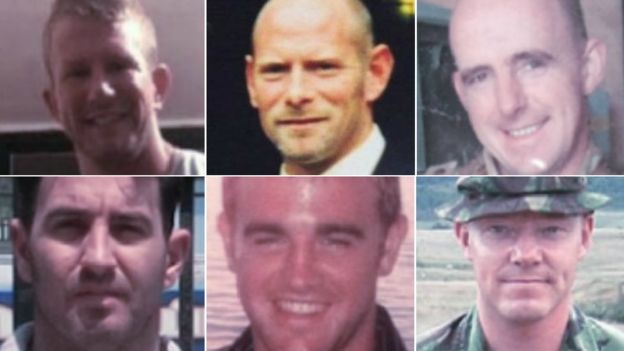
But much of it was spent in prison, sometimes four of them in a cell, other times more than 20 of them - the six Brits and their fellow crew.
They were the only westerners in a prison full of Indian criminals, including murderers and rapists.
They were targeted from day one; stones were thrown at them and they had to walk around in groups, ready to fight off any attack.
Their would-be attackers, stirred up by the official narrative that these newcomers were terrorists, were usually deterred by the size of these ex-military men.
But one day a brawl did break out.
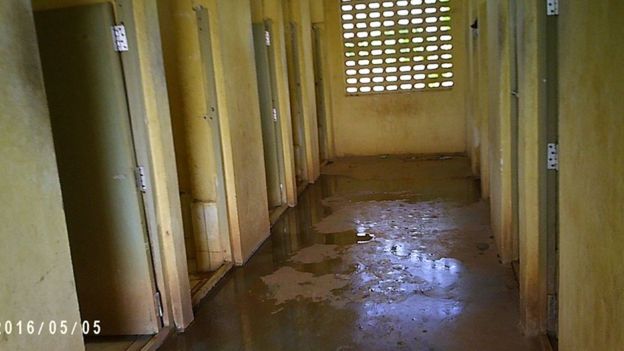 NICK DUNN
NICK DUNN
"All hell broke loose", Nick recalls in his new book Surviving Hell.
The Brits were set upon by a group of inmates while visiting the prison doctor, with crutches and chairs being used as weapons.
"Punches were thrown, prisoners were grappling with each other, and a number of bodies hit the ground," Nick said.
"It was complete pandemonium all around, with bodies being thrown about and fists flying."
The intervention of the guards brought the battle to an end, and the fight actually worked to the benefit of the men.
The other prisoners "must have looked at this group of big blokes, and the damage we had caused and, suddenly, they weren't so keen on a scrap", Nick wrote.
"They must have got the message because we never had any more trouble after that, at least not from the inmates."
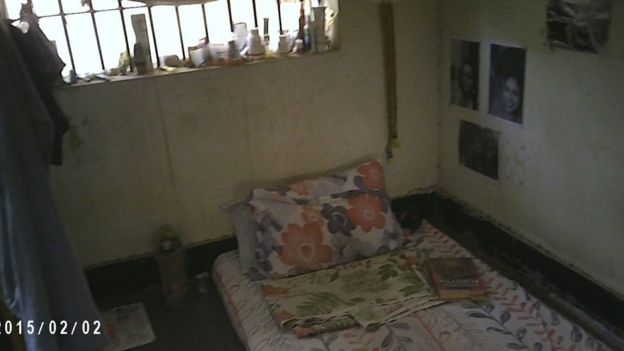 NICK DUNN
NICK DUNN
Any diversion from the grimness of prison life had to be organised by the men themselves.
Gym equipment was fashioned from the stones that littered the prison yard, a lifting weight made from a metal bar and rocks.
"The guards would always dismantle our makeshift gym, but every time they did, we rebuilt it again," Nick wrote.
"In the end, we pleaded with them to leave our equipment alone. Surely, we said, they could recognise we were setting a good example to other prisoners."
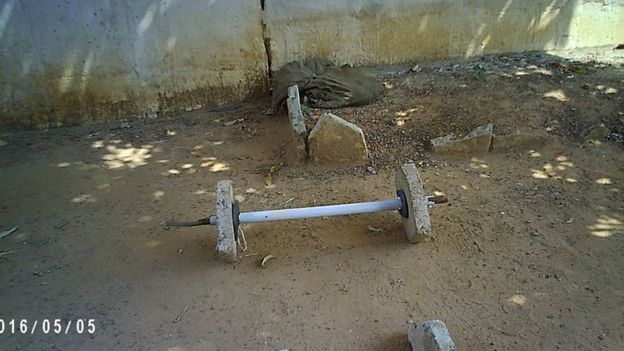 NICK DUNN
NICK DUNN
On 10 September 2017, while his sister Lisa ran the Great North Run to raise legal funding and awareness of her brother's plight, Nick completed his own half-marathon around the prison yard.
It was 27 laps in near 40C heat, much to the bewilderment of his guards and fellow inmates.
Some of his fellow Brits ran part of the race with him, while another managed to secure some oranges to provide a much-needed energy boost.
Food was generally scavenged from the scant supplies on offer, a rota being drawn up to decide who would go and cook in the prison's kitchen for the rest of the group.
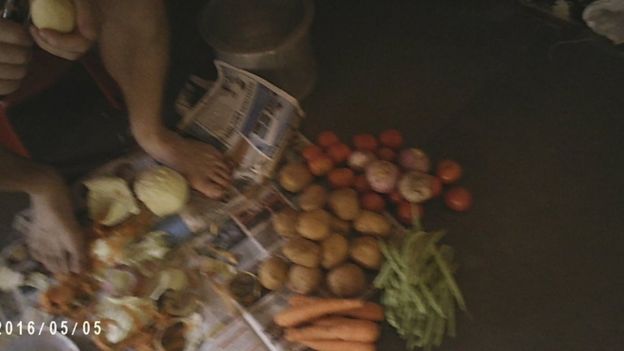 NICK DUNN
NICK DUNN
A bit of old pipe was rigged to a tap to create a rudimentary shower, an improvement from washing in a bucket.
"We were forever trying to make up for losing the comforts we took for granted when we were back home," Nick said.
"We just did what we had to do to make out lives a bit easier with what we had available, which wasn't a lot.
"You've got to keep on top of our hygiene. In that situation it's so easy to fall ill because it's just not a clean place."
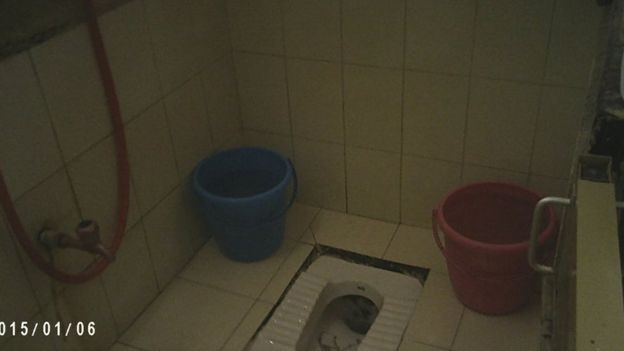 NICK DUNN
NICK DUNN
They bartered with Indian cigarettes called bidis and ate eggs, chapatis and stews fashioned from whatever they could source.
"Every day in that cookhouse was a battle," Nick said, adding: "We were coming to blows just to get hold of a pan, and we would have to kick off to make sure we had enough food to survive."
Chennai Six timeline
- 6 October 2013 - Nick boards the MV Seaman Guard Ohio in Sri Lanka to await deployment
- 12 October 2013 - MV Seaman Guard Ohio brought into port of Tuticorin by the Indian coastguard
- 18 October 2013 - Ten crew and 25 guards arrested and placed in prison
- February 2014 - Charge sheet containing 2,158 pages given to each defendant
- March 2014 - Petition signed by 136,000 people given to British government calling for the men to be given bail
- 26 March 2014 - Bail granted to 33 of the 35 men, including Nick
- July 2014 - Madras High Court throws out the charges, but the men must stay in India pending an appeal
- October 2014 - Indian police appeal
- July 2015 - Indian Supreme Court overturns Madras ruling and orders trial
- 11 January 2016 - Crew members found guilty and sentenced to five years in prison
- 27 November 2017 - Chennai appeal court acquits them, they are released from prison and free to return home
While the men languished in prison, their families campaigned relentlessly for their release.
Nick's sister Lisa, who had slipped him the spy-pen during one of her visits, harangued the UK authorities, appealing for them to intervene, but the men's appeal limped on through the courts and showed no signs of making any progress.
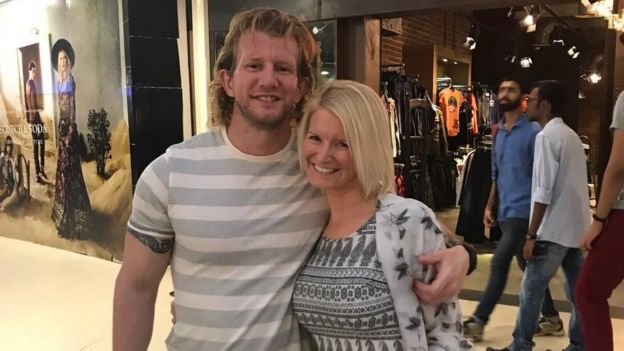 NICK DUNN
NICK DUNN
"I would say that it would take the death of one of us to end the ordeal for all of us," Nick said.
He was scarily close to the truth.
In the autumn of 2017, with the men two years into a five-year sentence, the tide started to turn.
Their ship's Ukrainian captain became seriously ill and "it became clear to everyone that he might be dying", Nick said.
"As I predicted, suddenly, the sluggish judicial system started to take notice of our case again.
"The death or serious illness of one of our number while we were in an Indian prison would be a serious embarrassment to the authorities."
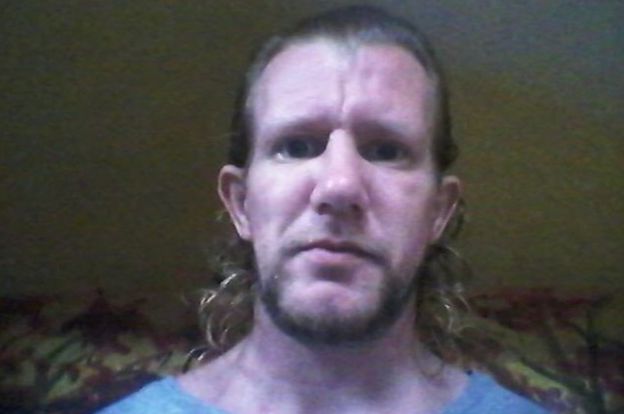 NICK DUNN
NICK DUNN
The case swiftly reached the country's chief justice Dipak Misra, who ordered it be resolved.
Judgement day was 27 November 2017, a Monday, the men staying in prison to await news of their fate.
After hours of nothing, the message came through - they had been acquitted.
"My knees just crumpled," Nick said, adding: "I was exploding inside."
They walked free from prison the following day and returned to the UK six days later.
Loud cheers reverberated through the arrivals hall at Newcastle International Airport when Nick finally emerged, his hair long and lank, to be embraced by a throng of family and friends.
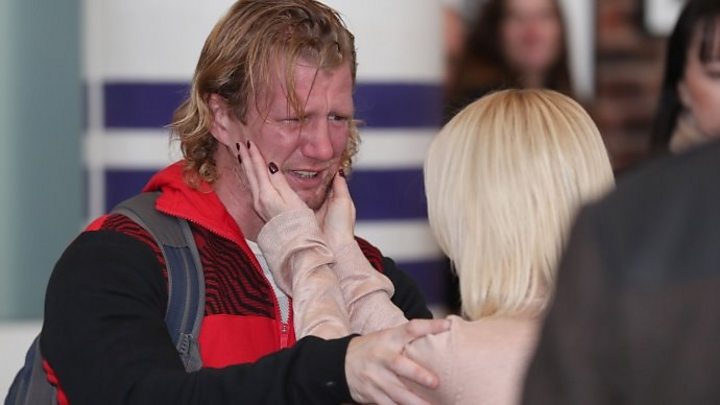
Several years on and Nick still works in security, although he is less keen to do so abroad.
"Things have changed in my life after going through what I went through," he said.
"I take each day as it comes now.
"There are days when I can feel a bit down and out, but I know I've been through a lot worse."
Follow BBC North East & Cumbria on Twitter, Facebook and Instagram. Send your story ideas to northeastandcumbria@bbc.co.uk.
Comments